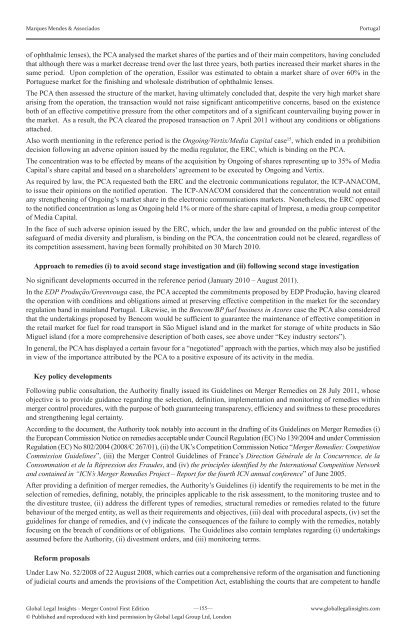Merger Controls First Edition - J Sagar Associates
Merger Controls First Edition - J Sagar Associates
Merger Controls First Edition - J Sagar Associates
Create successful ePaper yourself
Turn your PDF publications into a flip-book with our unique Google optimized e-Paper software.
Marques Mendes & Associados Portugal<br />
of ophthalmic lenses), the PCA analysed the market shares of the parties and of their main competitors, having concluded<br />
that although there was a market decrease trend over the last three years, both parties increased their market shares in the<br />
same period. Upon completion of the operation, Essilor was estimated to obtain a market share of over 60% in the<br />
Portuguese market for the finishing and wholesale distribution of ophthalmic lenses.<br />
The PCA then assessed the structure of the market, having ultimately concluded that, despite the very high market share<br />
arising from the operation, the transaction would not raise significant anticompetitive concerns, based on the existence<br />
both of an effective competitive pressure from the other competitors and of a significant countervailing buying power in<br />
the market. As a result, the PCA cleared the proposed transaction on 7 April 2011 without any conditions or obligations<br />
attached.<br />
Also worth mentioning in the reference period is the Ongoing/Vertix/Media Capital case15 , which ended in a prohibition<br />
decision following an adverse opinion issued by the media regulator, the ERC, which is binding on the PCA.<br />
The concentration was to be effected by means of the acquisition by Ongoing of shares representing up to 35% of Media<br />
Capital’s share capital and based on a shareholders’ agreement to be executed by Ongoing and Vertix.<br />
As required by law, the PCA requested both the ERC and the electronic communications regulator, the ICP-ANACOM,<br />
to issue their opinions on the notified operation. The ICP-ANACOM considered that the concentration would not entail<br />
any strengthening of Ongoing’s market share in the electronic communications markets. Nonetheless, the ERC opposed<br />
to the notified concentration as long as Ongoing held 1% or more of the share capital of Impresa, a media group competitor<br />
of Media Capital.<br />
In the face of such adverse opinion issued by the ERC, which, under the law and grounded on the public interest of the<br />
safeguard of media diversity and pluralism, is binding on the PCA, the concentration could not be cleared, regardless of<br />
its competition assessment, having been formally prohibited on 30 March 2010.<br />
Approach to remedies (i) to avoid second stage investigation and (ii) following second stage investigation<br />
No significant developments occurred in the reference period (January 2010 – August 2011).<br />
In the EDP Produção/Greenvouga case, the PCA accepted the commitments proposed by EDP Produção, having cleared<br />
the operation with conditions and obligations aimed at preserving effective competition in the market for the secondary<br />
regulation band in mainland Portugal. Likewise, in the Bencom/BP fuel business in Azores case the PCA also considered<br />
that the undertakings proposed by Bencom would be sufficient to guarantee the maintenance of effective competition in<br />
the retail market for fuel for road transport in São Miguel island and in the market for storage of white products in São<br />
Miguel island (for a more comprehensive description of both cases, see above under “Key industry sectors”).<br />
In general, the PCA has displayed a certain favour for a “negotiated” approach with the parties, which may also be justified<br />
in view of the importance attributed by the PCA to a positive exposure of its activity in the media.<br />
Key policy developments<br />
Following public consultation, the Authority finally issued its Guidelines on <strong>Merger</strong> Remedies on 28 July 2011, whose<br />
objective is to provide guidance regarding the selection, definition, implementation and monitoring of remedies within<br />
merger control procedures, with the purpose of both guaranteeing transparency, efficiency and swiftness to these procedures<br />
and strengthening legal certainty.<br />
According to the document, the Authority took notably into account in the drafting of its Guidelines on <strong>Merger</strong> Remedies (i)<br />
the European Commission Notice on remedies acceptable under Council Regulation (EC) No 139/2004 and under Commission<br />
Regulation (EC) No 802/2004 (2008/C 267/01), (ii) the UK’s Competition Commission Notice “<strong>Merger</strong> Remedies: Competition<br />
Commission Guidelines”, (iii) the <strong>Merger</strong> Control Guidelines of France’s Direction Générale de la Concurrence, de la<br />
Consommation et de la Répression des Fraudes, and (iv) the principles identified by the International Competition Network<br />
and contained in “ICN’s <strong>Merger</strong> Remedies Project – Report for the fourth ICN annual conference” of June 2005.<br />
After providing a definition of merger remedies, the Authority’s Guidelines (i) identify the requirements to be met in the<br />
selection of remedies, defining, notably, the principles applicable to the risk assessment, to the monitoring trustee and to<br />
the divestiture trustee, (ii) address the different types of remedies, structural remedies or remedies related to the future<br />
behaviour of the merged entity, as well as their requirements and objectives, (iii) deal with procedural aspects, (iv) set the<br />
guidelines for change of remedies, and (v) indicate the consequences of the failure to comply with the remedies, notably<br />
focusing on the breach of conditions or of obligations. The Guidelines also contain templates regarding (i) undertakings<br />
assumed before the Authority, (ii) divestment orders, and (iii) monitoring terms.<br />
Reform proposals<br />
Under Law No. 52/2008 of 22 August 2008, which carries out a comprehensive reform of the organisation and functioning<br />
of judicial courts and amends the provisions of the Competition Act, establishing the courts that are competent to handle<br />
Global Legal Insights <strong>Merger</strong> Control <strong>First</strong> <strong>Edition</strong><br />
—155—<br />
© Published and reproduced with kind permission by Global Legal Group Ltd, London<br />
www.globallegalinsights.com


